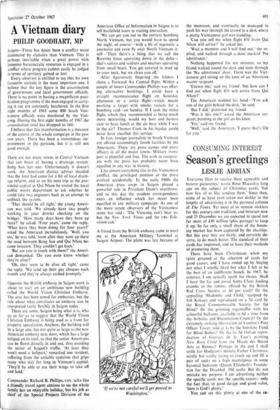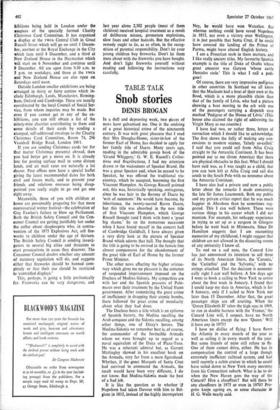Season's greetings
CONSUMING INTEREST LESLIE ADRIAN
'Everyone likes to receive these agreeable and bizarre picturettes,' wrote Rose Macaulay long ago on the subject of Christmas cards, 'but how few of us like sending them.' Since then, some of us have even taken our dislike to the lengths of advertising it in the personal column of The Times. Yet most of us remain sticklers for this century-old tradition, and between now and 25 December we are expected to spend not far short of £40 million (plus postage) to keep it up. So far only a small share of the boom- ing market has been captured by the charities. But this year they are likely, and certainly de- serve, to do much better. The standard of their cards has improved, and so have their methods of promoting them.
There have been Christmases when my spirit groaned at the selection of cards for good causes, and I have ended up by buying not what I wholly liked but what I felt to be the best of an indifferent bunch. In 1967, by contrast, I am actually spoilt for choice. Shall I have the fat and jovial Santa Claus feeding crumbs to the robins, offered by the British Red Cross Society at 4d per card? Or the appealing :Madonna and Child,' sculpted by Job Kekana and reproduced on a 5d card by the Royal Commonwealth Society for the Blind? Or the grinning ragamuffin with his colourful balloons, available at 6d a time from the Arthritis and Rheumatism Council? Or the extremely striking illustration of London's Post Officer Tower, sold at Is by the Sunshine Fund for Blind Babies? Or the Is 3d Oxfam repro- duction of Georges de la Tour's painting New Born Child from the Musee des Beaux Arts at Rennes? Perhaps in the end I shall settle for Hodgson's minute. Father Christmas, wittily but vainly trying to reach up and fill a pair of socks on a high mantelpiece in some baronial bedroom (Queen Elizabeth's Founda- tion for the Disabled, 10d each). But do not mistake my purpose. I am advertising neither the specific cards nor the specific causes: only the fact that, in good design and good value, 'here is God's plenty.'
You can see this plenty at one of the ex-
bibitions being held in London under the auspices of the specially formed Charity Christmas Card Committee. It has organised a display at the YWCA Central Club in Great Russell Street which will go on until 1 Decem- ber, another at the Royal Exchange in the City which lasts until 8 December, and a third at New Zealand House in the Haymarket which will start on 6 November and continue until 9 December. All are open from 9.30 a.m. to 5 p.m. on weekdays, and those at the YWCA and New Zealand House are also open on Saturdays until noon.
Outside London smaller exhibitions are being arranged in thirty or forty centres which in- clude Edinburgh, Leeds, Manchester, Birming- ham, Oxford and Cambridge. These are usually coordinated by the local Council of Social Ser- vice, from whom inquiries may be made. But even if you cannot get to any of the ex- hibitions, you can still obtain a list of the ninety-nine charities contributing to them and some details of their cards by sending a stamped, self-addressed envelope to the Charity Christmas Card Committee, Room 74, 296 Vauxhall Bridge Road, London SW1.
If you are sending Christmas cards (or for that matter Christmas presents) abroad, then you had better get a move on. It is already late for posting surface mail to some distant lands, and air mail rates are naturally a lot dearer. Post offices now have a special leaflet giving the latest recommended dates for both civil and forces mails, and to prevent your friends and relations overseas being disap- pointed you really ought to go and get one right away.
Meanwhile, those of you with children at home are presumably preparing for that more controversial winter festival—the celebration of Guy Fawkes's failure to blow up Parliament. Both the British Safety Council and the Con- sumer Council are getting justifiably hot under the collar about shopkeepers who, in contra- vention of the 1875 Explosives Act, sell fire- works to children under the age of thirteen. The British Safety Council is sending investi- gators to several big cities and threatens to start prosecutions in cases they discover. The Consumer Council doubts whether any amount of statutory regulation will do, and suggests either that fireworks should be banned com- pletely or that their use should be restricted to 'controlled displays.'
This, perhaps, is going a little puritanically far. Fireworks can be very dangerous, and
last year alone 2,302 people (most of them children) received hospital treatment as a result of deliberate misuse, premature explosions, slow fuses and other hazards. But the effective remedy ought to lie, as so often, in the recog- nition of parental responsibility. Don't let your young children buy fireworks. Don't let them mess about with the fireworks you have bought And don't light fireworks yourself without reading and following the instructions very carefully.











































 Previous page
Previous page